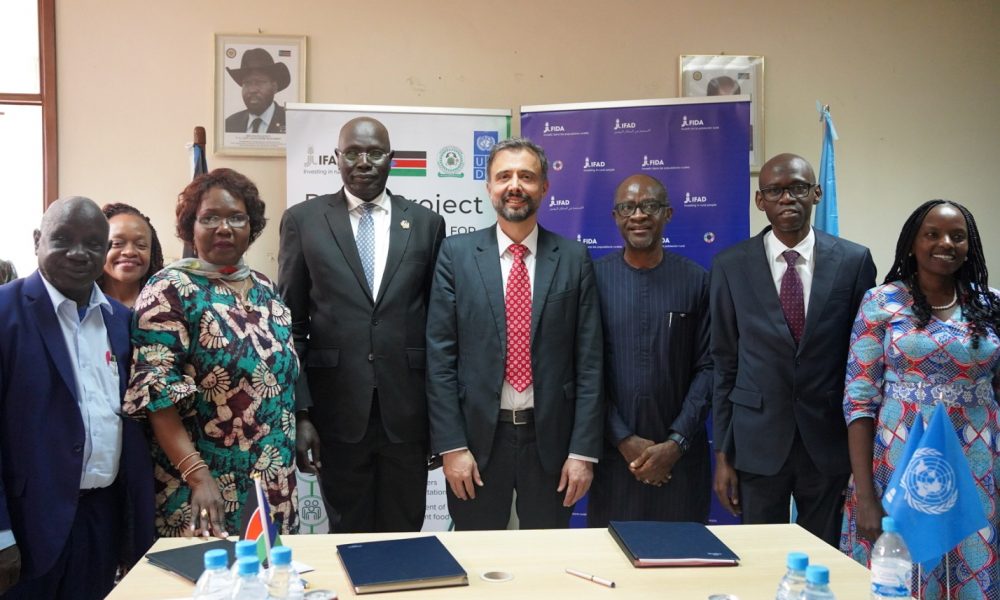By Bida Elly David
South Sudan government and three United Nations agencies have signed a financial agreement for a US$25.6 million project that aims to improve food security.
The Ministry of Agriculture and Food Security signed the deal with the UN’s International Fund for Agricultural Development (IFAD) and the UN Development Programme (UNDP).
The seven-year agreement signed on Tuesday, August 1, 2023, is also expected to increase income and generate resilience for rural households.
This development came following a visit by UN food and agriculture agency leaders to assess the Country’s level of agriculture in a bid to find amicable solutions.
In the press statement seen by this outlet, the UN agencies cited South Sudan’s food security deterioration due to localized conflict, displacement triggered by the Sudan crisis, and climate-related shocks like flooding.
According to the deal, the project dubbed Rural Enterprises for Agriculture Development (READ) is expected to reach 160,000 people, with a focus on women, youth, returnees, and people with disabilities.
The agreement states that IFAD will fund almost 80 per cent of project costs through a US$20 million grant from the Global Agriculture and Food Security Programme (GAFSP).
Additional financing will be provided by the Cooperative Bank of South Sudan (US$1.8 million), UNDP (US$1.5 million), the Government of South Sudan (US$1.4 million), and project participants (US$0.75 million).
“The UN’s International Fund for Agricultural Development (IFAD), the UN’s Development Programme (UNDP), and the Government of South Sudan today signed a financial agreement for a seven-year, US$25.6 million project that aims to improve food security, increase income, and generate resilience for rural households.” The statement partly reads.
According to the agreement, the project will be implemented between 2023 and 2029 in six states (Central Equatoria, Eastern Equatoria, Northern Bahr El Ghazal, Upper Nile, Western Equatoria, and Jonglei) with a “conflict-sensitive approach.
In collaboration with the Ministry of Agriculture and Food Security (MAFS), the project will help develop 500 rural producers’ organizations.
It will also help with policies and regulatory frameworks that promote good governance and accountability systems vis-à-vis their constituencies.
Josephine Joseph Lagu, the minister of agriculture, appreciated the UN development partners’ willingness to work jointly with the government to combat the food crisis in South Sudan.
“I express my profound commitment and capacity of the national Ministry of Agriculture and Food Security to work hand in hand with IFAD and all other relevant stakeholders to ensure the success of this project and improve food and nutrition security for all people of South Sudan,” said Mrs. Josephine.
Dier Tong Ngor, the national minister of finance, said the project will play a role in lifting the majority of people out of poverty.
He noted that there is recognition that the rural sector in South Sudan has massive potential for farming to fight food insecurity.
“The READ Project will lift the majority of our people out of poverty and foster an entrepreneurial culture, which will not only expand employment opportunities but also support economic recovery after this long conflict,” he said.
According to the UN’s Office for the Coordination of Humanitarian Affairs, a record 9.4 million people, or 76 per cent of the country’s population, are likely to require aid in 2023 as the country continues its march towards “freedom, equality, justice, peace, and prosperity, as stated in the South Sudan Vision 2040.
Alvaro Lario, the IFAD president, said in the statement, “Providing viable livelihood opportunities to rural populations is an essential step towards peace and prosperity.”
This means supporting small-scale farmers and rural producers with access to loans, financial services, and business skills while at the same time ensuring they have the capacity to cope with ever-increasing climate shocks.
On July 30th, leaders of UN food and agriculture agencies visited Juba for an assessment tour of the agricultural sector.
Before leaving the Country, the delegation, which consisted of heads of the World Food Programme (WFP), the International Fund for Agricultural Development (IFAD), and the Food and Agriculture Organization (FAO), met with the leadership of the Country and resolved ways through which food insecurity could be mitigated.




